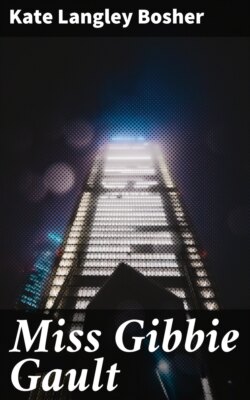Читать книгу Miss Gibbie Gault - Kate Langley Bosher - Страница 12
На сайте Литреса книга снята с продажи.
IN WHICH MARY CARY SPEAKS
ОглавлениеThe flourish of Mr. Milligan's hand as Mary Cary rose and came toward the platform was not to be resisted by Mrs. McDougal, who was clapping vehemently. She gave the hand a resounding smack.
"Fine words, Mr. Milligan, fine words! But a dead Irishman would make a good speech if you'd touch his tongue. You're an orationer, you are. Set down, quick! Miss Cary is going to speak."
"Mr. President, gentlemen of the council." The clear, fresh voice carried to the far corners of the room and upon the latter fell vibrating silence. "Yorkburg's fiscal year ending in June in the next few weeks, the annual budget for the coming twelve months will be fixed by you. Before this budget is made up I am going to ask you to act upon three propositions. Last year the total revenue of the town was $16,907.23, and your expenditures something under one thousand dollars less than your income. Out of your sinking-fund you retired a large proportion of your outstanding bonds, with the result that your indebtedness is now sufficiently small to justify your increasing it. I am here to-night to ask you to issue, during the next three months, fifty thousand dollars' worth of city bonds, interest on which is to be 3 per cent., payable semi-annually. If you will agree to do this promptly, Bartlett, Cramp & Company, of New York, will take the entire amount at once. At the expiration of twenty years these bonds are to be retired."
"In the name of glory!"
The words, half smothered, sounded even to the platform, and Mary Cary, catching them, laughed and nodded toward the source from which they came.
"Is there anything you wish to say, Mr. Billisoly, before I go on?"
The latter rose to his feet, put his hand to his mouth, coughed, and looked at Mr. Chinn.
"Yes'm, there is. Fifty thousand dollars is a powerful lot of money to borrow at one clip, and—"
"Three per cent. interest is powerful little money to pay for its use," she answered, smiling. "But that isn't all I am here to say. If you don't mind and will let me get through it will save time, and then questions can be asked and answered. Last year the rate of interest on all taxable property was one dollar and twenty-five cents per one hundred dollars. This year, Mr. Councilmen, if you really love Yorkburg, you will raise it to one dollar and thirty-five cents.
"Oh, I know," She laughed and lifted her hand as if to stop the unspoken protest of certain stirrings. "I know the name of taxes isn't truly pleasant to any one. But I have with me a list of taxpayers who agree to the increase asked for, and if you would like to see it, there is no objection to your doing so."
She opened her bag and took from it a roll of paper, and as she unwound it she threw one end to Mr. Ash, the chairman of the finance committee.
"This," she said, "is a list of the people who love their town enough to put their hands in their pockets to prove it. A truly trying test!" She held up her end of the paper. "There," she said, "there is the list."
Instinctively many leaned forward to see the paper which for reasons of her own she had made in one long, narrow ribbon, and as they did so she laughed again and nodded to the men at the desks. "The will of your constituents.
"And now"—she stepped back—"there is one thing more. Yorkburg has a friend who is greatly interested in its welfare. This friend believes the time has come when the town should take stock of itself, should look itself in the face and see just what sort of a town it is, and what it may be. As a friend of this friend of Yorkburg I am authorized to say that if this issue of fifty thousand dollars' worth of bonds be made promptly, the like amount of fifty thousand dollars will be at once deposited by Bartlett, Cramp & Company to the credit of your finance committee, said amount to be used for the relaying out of the town, the proper paving of streets, the planting of shade-trees, and the cleaning up of dirty places."
For a moment there was palpitating silence. No one moved. Eyes were fixed on her as if ears had not heard aright. The heads of some leaned forward, the bodies of others leaned back, then the clearing of throats and the shuffling of feet broke the pause that followed the statement which had just been heard, and back toward the door Mr. Benny Brickhouse arose.
"If he ain't the spittin' image of an orange with two peanuts underneath and one peanut on top, I never seen one," said Mrs. McDougal in a voice none too low, "and the top peanut ain't got a thing in it. Just listen at his cambric-needle squeak!"
